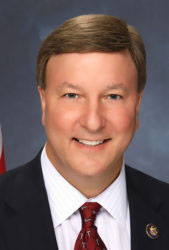More than a year after it was introduced, the proposed US Border Wall Funding Act of 2017 – which could tax remittances to countries like Guyana – continues to gain support in the US House of Representatives.
The bill, HR 1813, was on March 30, 2017 introduced to the United States House of Representatives by Republican Congressman Mike Rogers, of Alabama. It seeks to amend the US Electronic Fund Transfer Act so as to impose a 2% fee on all remittances headed south of the US border.
Initially the bill was referred to the Subcommittee on Crime, Terrorism, Homeland Security, and Investigations and the Subcommittee on Immigration and Border Security with eight co-sponsors. It has since gained five additional co-sponsors.
The original co-sponsors included Lou Barletta of Pennsylvania, Matthew Gaetz of Florida, Morris Brooks of Alabama, Austin Scott of Georgia, Trent Franks of Arizona, John Culberson of Texas, Trent Kelly of Mississippi, and Eric Crawford of Arkansas.
Representative Steve King of Iowa signaled his support on April 26, 2017, Brian Babin of Texas on February 27,2018, Tom McClintock of California on April 4,2018 while Ralph Norman of South Carolina, and Michael C. Burgess of Texas added their support on May 15, 2018.
If enacted, the bill, which is expected to have a five-year life span, would empower a remittance transfer provider to collect the fee if the designated recipient of a remittance transfer is located in any of the named countries. The fee is to be equal to 2% of the US dollar amount to be transferred (excluding any fees or other charges imposed by the remittance transfer provider).
It would also provide for the remittance transfer provider to retain up to 5% of the fees to cover the costs of collecting and submitting such remittance fees to the Treasury to be expended for the purpose of improving border security.
Stiff penalties for any failure to comply with its provisions, including fines and imprisonment also form part of its regulations.
Additionally, it proposes that any country that, in the joint determination of the Secretary of Homeland Security, the Secretary of the Treasury, and the Secretary of State aids or harbours an individual conspiring to avoid the fee collected shall be ineligible to receive foreign assistance and to participate in the visa waiver programme or any other programmes, at the discretion of the Secretaries.
Throughout his presidential campaign, US President Donald Trump called for the construction of a much larger and fortified wall, which estimates state will cost anywhere from US$21.6 billion to US$70 billion. Trump had maintained that Mexico would fund its construction but the Mexican government has vehemently rejected this position.
When it was first proposed state officials across the Caribbean sought to reassure their citizenry that they are considering the possible impact while noting that they are prepared to work with the CARICOM bloc to address the issue. Guyanese officials however were mostly silent.
Minister of State Joseph Harmon had told a post Cabinet press-briefing that “there is nothing that we can do about the way another country makes its laws the most we can say to those who send remittances is send more money. Clearly that is going to affect us but when the Americans make the law what we have to do is deal with the consequence of it. It will have an impact if passed and we will have to look and see how to deal with that.”
Meanwhile, the Jamaica Gleaner reported that the Jamaican government has indicated that it is keeping a close eye on the draft bill.
An April 28, 2017 report, headlined “Jamaica Keenly Monitoring US Border Wall Funding Proposal,” references a statement in which their Ministry of Foreign Affairs and Foreign Trade said that it was fully aware of the situation.
Minister, Senator Kamina Johnson Smith was quoted as saying that “hundreds of drafts bills are introduced by congressional representatives every year, but many of them fail to make it through the extensive legislative process,” even as she noted that Jamaica is prepared to work with CARICOM in a coordinated approach.
Antigua’s Foreign Affairs Minister Charles Fernandez had also told state media on that Island that Caricom countries will, along with countries in Latin America, speak with one voice in opposing the proposed bill.
He expressed the fear that if passed the new measures could result in the remittances system going underground.
The Barbadian Minister of Finance Chris Sinckler had also, according to the Caribbean Broadcasting Corporation, advocated for a regional response to the measure.
Former Jamaican Ambassador to the United Nations Curtis Ward, in an Op-Ed for the Antiguan Tribune, urged US lawmakers to remember that remittances are not faceless or the result solely of illegal immigration. He argued instead that “hundreds of thousands of members of the immigrant community who send remittances are U.S. permanent residents and citizens who already pay taxes…. It is immoral to propose a tax on life-saving financial support; on life-sustaining support sent by a son or daughter to his or her elderly parent or grandparent.”






